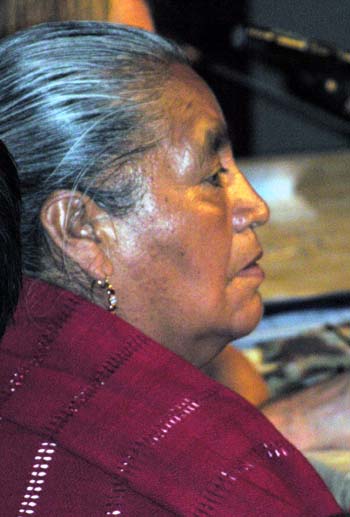|
Matriarchies challenge
neo-liberal globalization
December 1, 2005
Press release from FIRE/RIF – Feminist
International Radio Endeavour
By María Suárez Toro
San José, Costa Rica
|

Doña Enriqueta
Contreras of the Zapoteca Mayan indigenous community
in
Oaxaca, Mexico
|
The audience listened closely as Doña Enriqueta Contreras of the Zapoteca Mayan indigenous
community in Oaxaca, Mexico,
described how her pre-Colombian
culture has always been devoted to the reverence of Nature and
equality between men and women, despite efforts by the
Spanish “invasores” (invaders) to impose a contrary
value system.
Doña Enriqueta also denounced the
current plan by Wal-Mart Corporation to establish a store in
Juchitlán, and then made a connection of this project to
patriarchy both past and present: “Despite the fact that our
respect for the divinity of nature was overlaid by European
Christian ideals that were male-centered and patriarchal,
our regard for the sanctity of Nature, and our imperative
connection to it has survived the holocaust of that first
fateful meeting five centuries ago. But we will fight it now
with Wal-Mart,” she concluded.
Juchitán is a town in southern
Mexico. Its 100,000 inhabitants belong to the ethnic group
of the Isthmus Zapotecs, with about 350,000 people living in
the coastal plains of the Isthmus of Tehuantepec.
According to Prof. Veronika
Bennholdt-Thomsen of Germany, “The Juchitecan society is
a matriarchal society that is well nourished and relatively
wealthy, whereas normally ‘indigenous' and ‘poor' are nearly
synonymous.” She claims that their wealth is due to a well
functioning regional economy which is the result of the work
of the woman traders. That is precisely what would be
dismantled if Wal-Mart were to come into town. |
|
“This chain store that is part of
a multi-national corporation will in no way contribute to
our well-being,” stated Rosa Martha Toledo, a Juchiteca from
the same area in México. “We thrive on local food and
sharing.”
Both indigenous women were
speaking at the Second World Congress on Matriarchal
Studies held in San Marcos,
Texas from September 29-October 30, 2005, to share how they
have survived the many expressions of Patriarchy in their
region. But the women also came to challenge participants
to support their struggle to ban Wal-Mart from establishing
a store in their town.
Women participants from several
matriarchal communities around the globe who attended the
Matriarchal Studies Congress made similar statements
regarding their need for support in order to counteract the
impoverishment of their communities and its impact on their
matriarchal social and political structures.
|

Rosa Martha Toledo,
a Juchiteca indigenous woman from Oaxaca, Mexico |
Organized by
Heide Goettner-Abendroth with the cooperation and sponsorship of
Genevieve Vaughan and the Center for the Study of the Gift Economy
(Austin, Texas), the Congress brought together more than 50 scholars
from Europe and the USA with indigenous women and men from
matriarchal societies as main speakers in the event, such as:
Dr. Barbara Alice Mann,
Bear Clan of the Ohio Seneca, Iroquois (USA), Jeannette C.
Armstrong, Syilx, Okanagan (Canada),
Mililani B. Trask (Hawaii),
Taimalie Kiwi Tamasese, Samoan (Samoa, New Zealand),
Mariela de la Ossa, Kuna (Kuna
Yala, Panama), Fatimata welet Halatine, Imajaghen, Tuareg (Central
Sahara), Dr. Wilhelmina J. Donkoh, Akan (Ghana), Gad Agyako Osafo,
Akan (Ghana/Germany), Dr. Yvette Abrahams, Khoekhoe (Namibia, South
Africa), Bernedette Muthien,
Khoisan (South Africa),
Patricia Mukhim, Khasi (Megalaya,
Northeast India), Ibu Ita Malik M.A., Minangkabau (Sumatra,
Indonesia), Prof. Lamu Gatusa, Mosuo (Southwest China), and Hengde
Danshilacuo, Mosuo
(Southwest China), among others.
All participants discussed both the
theoretical and the cultural/political aspects of matriarchal
societies with an audience of more than 500 men and women.
Genevieve Vaughan made the connection between
Wal-Mart and Patriarchy when she stated that “Patriarchal
Capitalism is based on the market and the taking of many unseen
gifts. The logic of gift-giving provides an alternative to the logic
of the market. For this reason gift-giving has been devalued and
made invisible though it has not ceased to exist.”
Heide Goettner-Abendroth affirmed the idea that
matriarchal studies can showcase alternatives
to destructive social and economic models, when she said that “these
studies shed light on a form of society that can inspire us to find
better social and cultural models to solve many contemporary
problems.”
Congress participants made commitments to
further develop the study of the contribution that present day
matriarchal societies make, and also to help disseminate the needs
that women have in those communities to further develop their
peaceful and gift-giving perspectives. In addition, participants
from the United States and Europe told their stories of struggle
against Wal-Mart and other huge corporate chain stores to their
Mexican colleagues and commited to support them in their rejection
of chain stores in their country.
The Congress was
dedicated to the memory of Marsha Gomez 1951-1998), indigenous
artist, activist and mother (December 24, 1951
- September 29, 1998).
The First World Congress of Matriarchal
Studies took place with great success in September 2003 in
Luxembourg/Europe, with the title:
Societies in Balance: Gender
Equality, Consensus, Culture in Matrilineal, Matrifocal, and
Matriarchal Societies.
You may reprint or re-distribute this press release but
please
give credit to RIF/FIRE, Apartado 239, Ciudad Colon, Costa Rica;
oficina@radiofeminista.net. |

